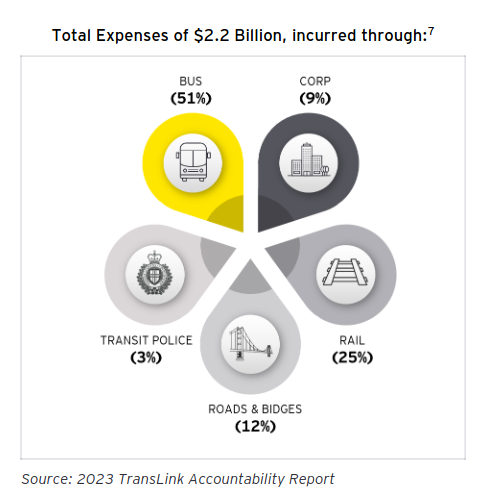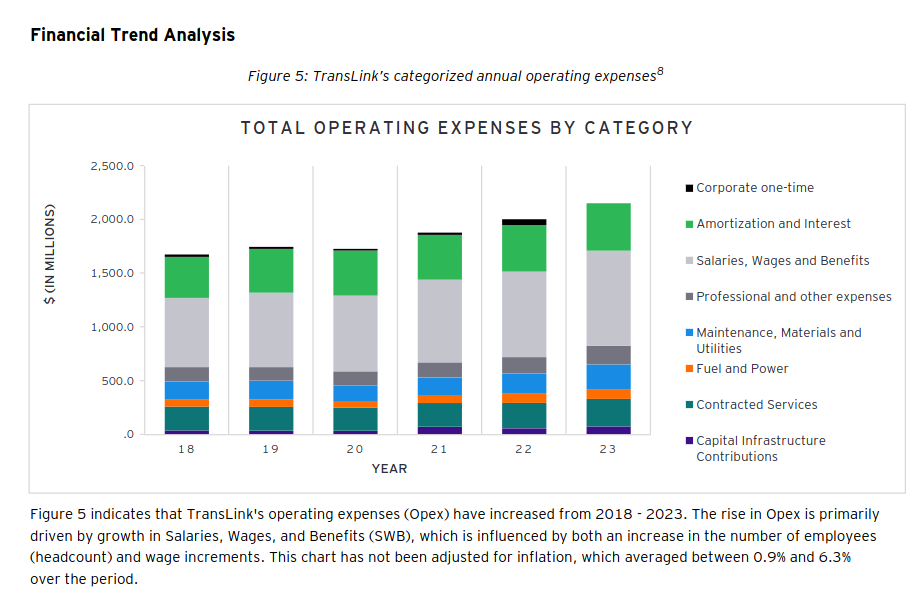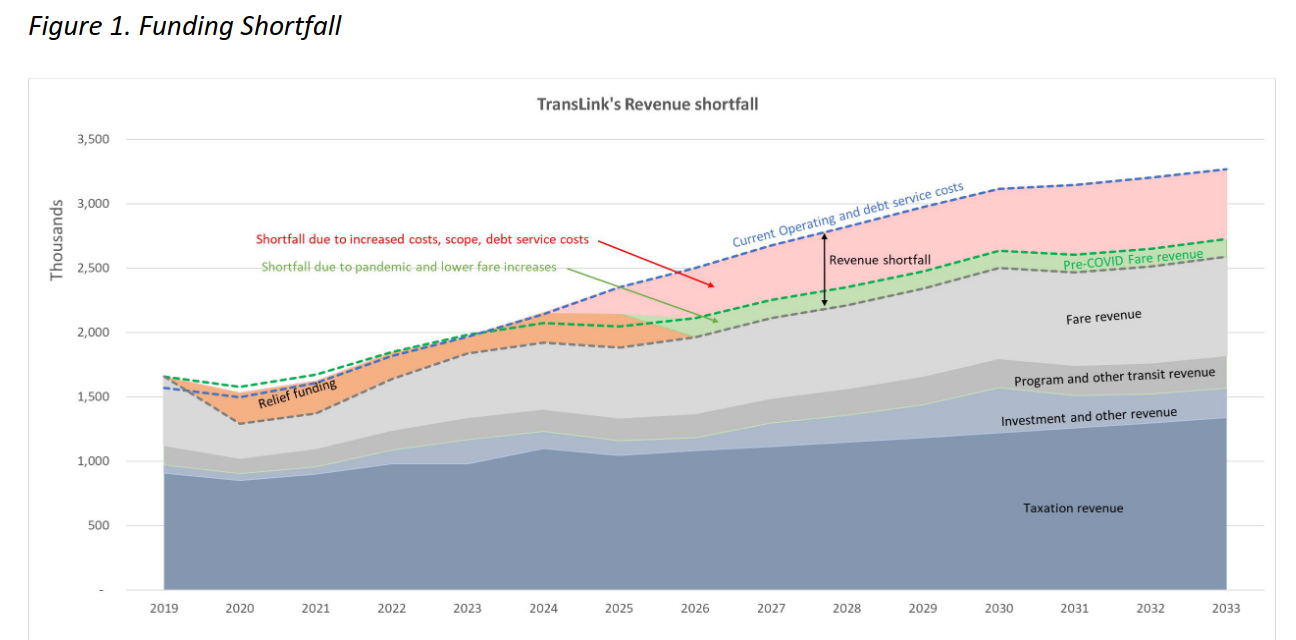TransLink Funding
BC Transit Funding
Two federal funding allotments:
- Public Transit Fund
- Canada Community-Building Fund
The Canada Public Transit Fund is an infrastructure fund announced by the federal Liberal government in the 2024 budget. The fund will start issuing money in 2026.
- Infrastructure, not operations
- $30 billion
- $3 billion a year
- Application driven.
Canada Community-Building Fund used to be known as the Gas Tax Fund.
-
British Columbia total: $1.6 billion over five years.
- TransLink: $825M over five years
There are two sides to transit (like everything) capital and worker costs. Also known as infrastructure and operations.
The federal government provides funding for infrastructure through capital grants and funding allotments directly to transit.
The provincial (and municipal) governments are supposed to fund operations and use transfers to fund the remaining shortfall. Part of the reason for this is the Constitution, but part of it is just good government structure. Municipalities and provinces are responsible for regulating transit operations, setting rider fares, deciding routes, etc. and setting the structure of transit companies.
Transit operations in BC
In BC, there are two provincial-level transit operators:
- TransLink
- BC Transit
TransLink is a strange quasi-privatized government funded non-profit company known as a "statutory authority".
TransLink manages:
- Coast Mountain Bus
- SkyTrain
- Surrey Langley SkyTrain
- West Coast Express
- RapidBus
- HandyDart
- Metro Vancouver Transit Police
- Ferry services
These operate across Metro Vancouver and Fraser Valley.
TransLink is responsible for transit infrastructure like transit-focused bridges, bicycle infrastructure, fuel stations, pavement costs, and workers and passenger facilities.
There is also a massive electrification program that will increase costs of vehicles and result in new electric infrastructure spending.
BC Transit is a Crown Company, but it is designed to manage privatized contracts for bus services in municipalities outside of Vancouver. The only bus operations it directly operates are Victoria Regional Transit System on Vancouver Island.
The break-up of the state-run public transit authority into these two entities has created a complex funding mess.
TransLink funding
TransLink has consistently faced a budget crisis since it faces a complex funding system based on revenue from fares, fuel taxes, the province, municipalities, and federal government. It is debt financed with ability to get its own credit from private markets. The company is not an agency of the government, so its debt is much more expensive than BC/federal public debt.
With the collapse of ridership during the Pandemic, operations funding has dried-up and with the increase in interest rates the debt has become more expensive to hold, and increases in ongoing costs because of inflation.
Breakdown of estimated budget shortfall:
- $459 million: increased debt servicing costs
- $2.8 billion: lower fares and fuel tax revenues
-
$1.8 billion comes from higher expenses
- $839 million: inflation and wage growth
- $408 million: operations for SkyTrain expansions


Revenue shortfall
TransLink will face an annual revenue shortfall of $600 million beginning in 2026 according to the company. The company is calling the funding shortfall a "structural deficit". The structure they are referring to are statutory requirements of fully funding their investment plan. That "structure" will result in an operations cut of almost 60% starting in 2026.
The sudden onset of such a massive structural deficit is mostly a result of the loss of pandemic relief funding plus some increases in ongoing costs:
- Relief funding: $478.9 M
- Needed additional funding: $600 million per year starting in 2026

Ridership Gap
There is also an ongoing "ridership gap" resulting from reduced use of transit because of shifting work habits, rise in cheaper alternative modes of transport, and changes to the make-up of downtown economies. The rise of remote work from 7% to 20% has had a structural impact on funding models for transit operations reliant on user fees.
Vancouver office costs are extremely high putting additional pressure on firms to structure work from home to reduce office sizes and sustain remote work.
TransLink Funding Gap Campaign
The result of declining revenue is a massive funding gap in the billions of dollars.
TransLink puts the gap at $4.7 billion.
To make the point clear to the public the CEO Kevin Quinn has launched a campaign with press releases and videos directed towards the public. The company's goal is to connect its poor service deliver directly to lack of funding and justify fare increases.
The campaign would be strange in any context except the odd structure of TransLink in BC that is "independent" from government.
The company's funding request is focused on declining COVID-19 emergency relief funding, lack of increase in user fares, and slow growth in government funding.
The other response from the company has been significant cuts to its operations budget and employment. The impact of such cuts will likely result in reduced quality of operations in the medium term.
Solutions?
While fixing the operations model of TransLink and BC Transit are likely necessary, such a task is years out and does not address the current funding issue.
There is only one solution: more public money into operations.
The questions are:
- what level of government is going to increase their share of funding and by how much
- how that money is going to flow through to the transit services given the strange structure of TransLink
- the make-up of that revenue (fees vs taxes)
The only solution is a central table to negotiate these solutions between the different levels of government and matching statutory obligations put on TransLink with sufficient funding arrangements.
Options for reduced expenses include:
- shifting debt costs to a level of government where the debt would be less expensive and/or not paid out of funding allocations to TransLink.
- transferring some infrastructure (like road maintenance, bike share funding, etc) funding responsibilities from TransLink corporate to government.
 Marine Road Rail
Marine Road Rail